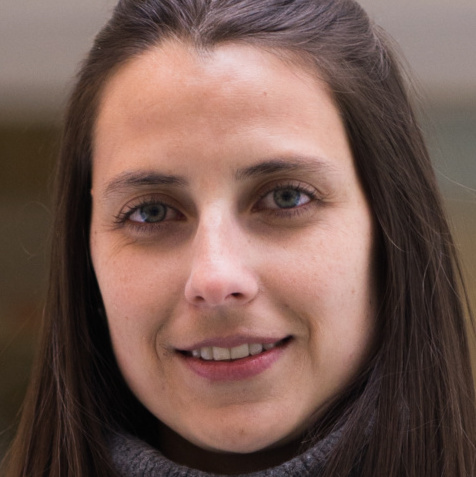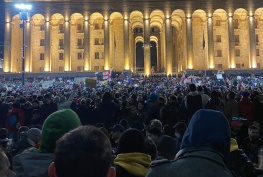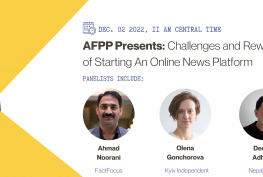
By Daniela Castro |
It was a cold night in mid-March when I arrived at the Columbia Regional Airport in Missouri — a Midwestern state that’s unknown territory for me. I arrived with two bags fully packed, and was prepared for the six-month fellowship program that was about to start. I also was carrying with me many plans and goals that I wanted to achieve.
It was around 10:30 p.m. and here I was, ready and excited to undertake this new adventure and overcome any challenges that came my way. David Reed, the program director for Alfred Friendly Press Partners, and a Turkish journalist who had arrived on an earlier flight, Bilge Kotan, were waiting for me next to the tiny baggage carousel. I was the last of the three women in the program to land on that spring night.
In the previous days, before coming to Columbia, I had imagined how the whole experience would be, the place, the people, the food, the atmosphere, the other fellows. I was very eager to start the hands-on specialized training at the Reynolds Journalism Institute on the University of Missouri campus. In particular, I was eager to learn more about data journalism and open-source reporting. I couldn’t wait to work for five months at the NBC News Investigative Unit in New York to improve my investigative skills as well as my written English, and to learn more about the techniques and tools that journalists were using in their investigations.
When I left my home country, Colombia, in South America, the coronavirus pandemic had already started to spread around the world. But at that point there were not many cases reported in the American continent.
It was a matter of time before the virus started to hit hard and spread widely across the Americas. The expanding outbreak changed some of the fellowship plans, just as it started to disrupt people’s lives all over the world. There was no option. We had to adapt to the unusual circumstances and make the most of this unique opportunity and experience.
In the first week of the training on campus, the in-person classes at the University of Missouri were suspended and went online for the rest of the spring semester to help prevent the spread of the virus. In that first week, we got the training in a pretty empty and quiet school that in normal circumstances would be full of students.
In the second week, the university was closed and we started to get the training over Zoom videoconferencing from our houses (a few blocks away from the school and the city’s downtown) from professional practice faculty and Investigative Reporter and Editor’s (IRE) trainers. In the third week, the program was officially suspended because of the pandemic after the initial training period. This meant that we were not going to be able to do the newsroom internships and receive the usual face-to-face guidance.
It was heartbreaking to know that the program would end sooner than expected or planned.
In response to the new circumstances posed by the pandemic, the training was extended for an additional week.
In the full four weeks of training, we received comprehensive coaching in all the areas of journalism, which were complemented with assignments to put in practice what we had just learned: from verification and fact-checking, to video, photojournalism, business reporting and multimedia reporting, to name a few. We also had lessons on all sorts of topics, including understanding and covering corruption with experts at TRACE International, journalistic writing conventions in US newsrooms, business reporting and reporting on nonprofits, digital security, covering trauma, among others.
And we had a very interesting and timely session on the coronavirus coverage in China, with 2019 Alfred Friendly Fellow Yan Zhang (The Initium Media where Zhang is a Chief Correspondent, has published all sorts of coronavirus related-stories in China and in other places, including the U.S.)

After our photojournalism class, we were given an assignment to shoot photographs that captured what it was like in the city of Columbia in times of coronavirus. Here is one I took of a biker and a runner crossing paths near a tunnel on the MKT Nature and Fitness Trail. Few people are seen in this nine-mile recreational trail as measures like social distancing are recommended to control the spread of the coronavirus pandemic.
Amid the challenges and changes to the program that brought the coronavirus situation, David Reed and Alfred Friendly Foundation President Randall Smith, as well as all the teachers and trainers, made an amazing effort to provide us with the training that was planned for us. For many, if not all of the trainers, it was the first time that they taught the courses online and the result was incredible.
This first part of the fellowship far exceeded my expectations. I learned new tools and tips that I can now apply to my investigations.
Aside from the training-related part, David and Randy also understood the stress and anxiety that was produced by the situation, and they have made the best they can to make us feel safe and comfortable during our stay here. For those of us who are still in Columbia, David has also kept our spirits up, by taking us out for short trips, always keeping the so-called “social distancing” and all the proper care to prevent the contagion, of course.
Although the Colombian president recently announced that the international flights will not be allowed until the end of May — the closure of the borders is a measure that many countries have taken to control the spread of the virus — it’s still uncertain when I’ll be able to return home because the deadline could be extended for a third time.
With no doubt, the almost six weeks in Columbia have been a rollercoaster ride for me. But these uncertain times also brought other opportunities for growth and learning.
This situation allowed me and the other fellows to develop and forge strong bonds among us, supporting and taking care of each other and making sure that everyone was emotionally fine and healthy.
I also had the opportunity to meet amazing and smart people and colleagues from around the world and learn something from each one of them. And I had the pleasure of tasting Bilge Kotan’s Turkish delicacies that she cooked in our house with so much passion.
I don’t want this chapter in my life to end here. I deeply hope to be able to come back next year, or whenever it’s a better time, and finish the fellowship program.
I’m very grateful to Alfred Friendly and the TRACE Foundation for giving me this amazing and unique opportunity and lifetime experience to enhance my professional performance, acquire new skills and learn tools and research techniques that will allow me to continue doing what I love: uncover corruption and produce investigations that contribute to social justice and accountability.
It’s not goodbye, but see you later.





